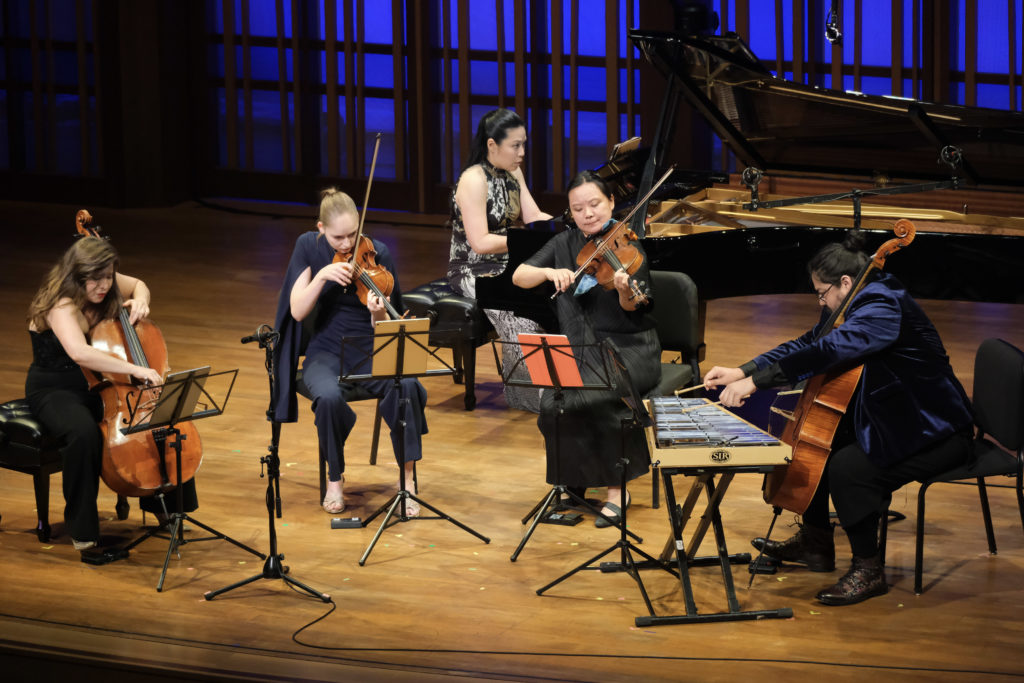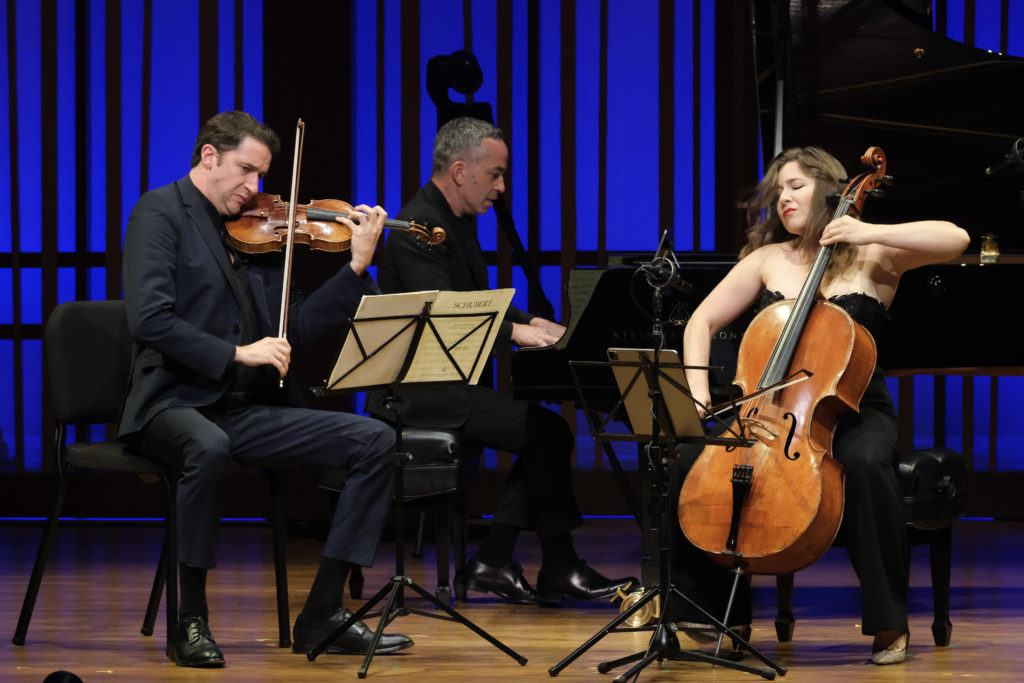SummerFest Offers An Incomparable Account of Schubert’s E-flat Major Piano Trio
Since the earliest days of La Jolla SummerFest under Heiichiro Ohyama, the festival’s calling card has been its high caliber of musical performance. As an observer of the festival over its several decades, I can say both the overall level of musical performance and the audience’s expectations of excellence have gradually but perceptibly increased.
From time to time, however, the performance of a single work rises above SummerFest’s own lofty standard. I expect no dissent from the claim that Sunday afternoon’s performance of Franz Schubert’s Piano Trio In E-flat Major, Op. 100, by violinist Noah Bendix-Balgley, cellist Alisa Weilerstein, and pianist Inon Barnatan soared above the festival’s enviable current standards.Of course, Schubert’s Piano Trio in E-flat Major is one of the composer’s most exalted works, completed during his final year when he also finished his Ninth Symphony, the F Minor Piano Fantasy, and the Schwanengesang song cycle. From the opening phrases of this performance it was immediately evident that Sunday’s audience had entered a distinctly empyrean realm. These three musicians were playing in unassailable agreement about Schubert’s communication in every phrase, every crescendo, every accent—even every rest.
Radiant in its dramatic but deftly shaped dynamic contrasts, the ensemble’s bracing opening “Allegro” movement also benefited from the extraordinary quiet to which the Baker-Baum Concert Hall adjusted as the audience fixed its complete attention on this vivid and immaculately detailed performance. Barnatan demonstrated how to coax an alluring sonority from the Steinway’s typically strident highest register. His crystalline figurations in that upper range provided the perfect complement to his ebullient, cascading runs that descended into the instrument’s resonant bass register; he was powerfully matched by resonant, commanding phrases from Bendix-Balgley and Weilerstein.
I only have to hear the piano accompaniment’s opening two measures of the “Andante con moto,” the Piano Trio’s second movement, to have a telling scene from Stanley Kubrick’s 1975 motion picture Barry Lyndon pop up in full color in my memory. The movement’s plangent, mesmerizing minor mode cello theme has found its way into many a movie sound track, and Weilerstein’s resplendent account of this theme was breathtaking, especially as the trio suavely transformed it into its ingratiating major mode guise.
In the “Scherzo,” the trio stressed its pellucid structure, maintaining an elegance—in spite of its unpredictable lacunas—made even more lustrous by the players’ astonishingly precise attacks and releases. This approach transferred seamlessly into the “Allegro moderato,” an unusually expansive final movement in which Schubert flouts convention to bring back twice the heavenly theme from his second movement. The musician’s fervent ebullience brought both the work and the concert to an exhilarating conclusion.
Before the intermission, Sunday’s audience was treated to a short recent piece by SummerFest cellist Paul Wiancko, Closed Universe for Solo Cello, Piano Quartet, and Glockenspiel, and Ernst von Dohnányi’s rarely encountered Piano Quintet in C Minor, Op. 1.

(l. to r.) Alisa Weilerstein, Geneva Lewis, Joyce Yang, Teng Li and Paul Wiancko [photo (c.) Ken Jacques]
Ernst von Dohnányi’s more traditionally voiced four-movement Piano Quintet, Op. 1, is a surprisingly accomplished work from a 17-year-old, and pianist Joyce Yang and the Takács Quartet gave the expertly structured work a compelling performance. But I don’t believe its rarity on chamber music programs is a mystery. For all of its polish and surface excitement, the young composer did not have much to say.
This concert was presented by the La Jolla Music Society on August 13, 2023, in La Jolla’s Conrad Prebys Performing Arts Center. The festival continues in this venue through August 26, 2023.

Ken Herman, a classically trained pianist and organist, has covered music for the San Diego Union, the Los Angeles Times’ San Diego Edition, and for sandiego.com. He has won numerous awards, including first place for Live Performance and Opera Reviews in the 2017, the 2018, and the 2019 Excellence in Journalism Awards competition held by the San Diego Press Club. A Chicago native, he came to San Diego to pursue a graduate degree and stayed.Read more…


No dissent re the superb Schubert. Transforming. We are so very fortunate. Also really enjoyed the revelatory performance of the Dohnanyi. Much more than Mrs. H.H.H. Beech!
It is quite possible that I was more predisposed to like the Amy Beach chamber work because my colleague Barbara Scheidker and I are playing our arrangements of her piano four-hand suite “Summer Dreams” for Scott Paulson’s upcoming annual Toy Piano Festival.